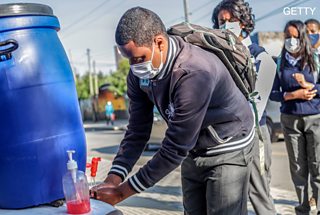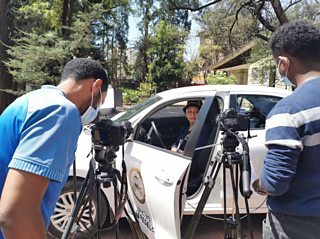Continuing the fight against COVID-19 in Ethiopia
Annis Tefferi
Social Media Producer, �������� Media Action Ethiopia
Tagged with:
Amid unrest and pandemic fatigue, our Ethiopia team is working to deliver trusted information about COVID-19 as well as inspirational stories about how people are coping. Our social media producer Annis Tefferi gives us the behind-the-scenes view.
I joined �������� Media Action earlier this year as the pandemic was beginning, when we were just starting to understand the huge impact it would have on our work and on our society. Since then we have worked through a six-month national emergency, and adjusted under difficult circumstances to continue providing trusted health information in multiple languages in Addis Ababa, and in Amhara and Tigray regions.
Our work on COVID-19 is focused on three areas. The first is on the virus itself – how it is transmitted, how to protect yourself, symptoms and how and when to seek treatment, and how families and communities can best care for each other and cope in this difficult time.. We are examining the impact of COVID-19 on the lives of women and girls. And we are raising awareness about misinformation, to dispel and counter the dangerous rumours that circulate about COVID-19.
We are creating public service announcements, social media content and a new radio segment covering all these themes. We are also supporting partner radio stations in Amhara and Addis Ababa with our Lifeline training, so that they are better able to report on the pandemic, check their facts and share trusted information, and stop the spread of misinformation. Our hope is that these radio stations are better able to serve their audiences with what people need and want to know.

A man washes his hands in Addis Ababa, Ethiopia. Credit: Getty Images
Public interest media are essential in the pandemic to reach a wide audience with trusted information. Radio is still the most powerful format in Ethiopia, as many remote and rural communities otherwise have no access to media at all. Our support for our partner radio stations helps ensure these communities receive reliable information.
But in urban centres, Internet use is exploding, especially through mobile phones and among young audiences. We are proud that our new Facebook page, launched earlier this year, already has more than 11,000 followers, and we are working hard to make sure we can reach audiences and engage wherever they access information most.
The biggest problem we face now is that people are tired of hearing about the pandemic, and some are even beginning to forget about the importance of using face masks and physical distancing. The six-month state of emergency declared to control the virus has been lifted, although COVID-19 prevention measures remain in place and are required for people who run businesses that attract large numbers of customers.. The initial fear and panic seem to have passed. People are much more worried about their livelihoods, everyday social issues and security amidst the possibility of further unrest. It is almost as if the pandemic has been forgotten.
But we are still at risk. As of November, we have had more than 100,000 reported cases till November, although the figures may be underreported as people do not always have access to testing. In rural areas in particular, access to water is often difficult, so it can be hard to practice regular handwashing with soap.
As we pay more attention to the impact of the pandemic on people’s lives and livelihoods, and how they are coping, we continue to remind audiences across all of our outputs that COVID-19 hasn’t gone away, and that it’s still important to wash hands regularly, maintain physical distancing and wear face coverings. We constantly challenge ourselves to ensure all our stories are engaging and memorable to grab people’s attention! This is an exciting part of the job.
When we started off, we worked on a series of stories about ordinary people supporting the most vulnerable in their communities. One was about a woman who is highly vulnerable to COVID-19 because of a lung condition, and how a group of young entrepreneurs in Addis Ababa ensured she was able to stay at home while continuing to make a living by supporting her in a bead-jewellery-making enterprise. Her products were collected from her and sold online, with the proceeds returned to her to look after herself and her daughter. That was really inspiring, to see how people can support each other to get through this pandemic. I was touched by this story and to date it remains my favourite.

Filming the ride-sharing service for women, by women, in Addis Ababa. Credit: �������� Media Action
Another story that I feel strongly about is a film about a new women-led ride-sharing company, whose drivers are also all women, and how they are working to keep drivers and passengers safe. This start-up success is a positive story of women’s economic empowerment at a time that is especially difficult for women and girls, because of disruptions to education and employment, and increased risk of domestic violence.
The ultimate joy and pride for me comes from the fact that my work will provide people with information that helps them and their families and communities stay safe, while dealing with the impact of the pandemic on their everyday lives.
It has been a challenging time to work in health communication but we know that it’s important to continue. It will take help from every part of our society to control the virus and our work is helping to remind people that they need to be aware of its impact, and to continue to protect themselves as best they can.
The Lifeline communication in the COVID-19 pandemic project is funded by and running in Ethiopia, Indonesia, Afghanistan and Bangladesh.
